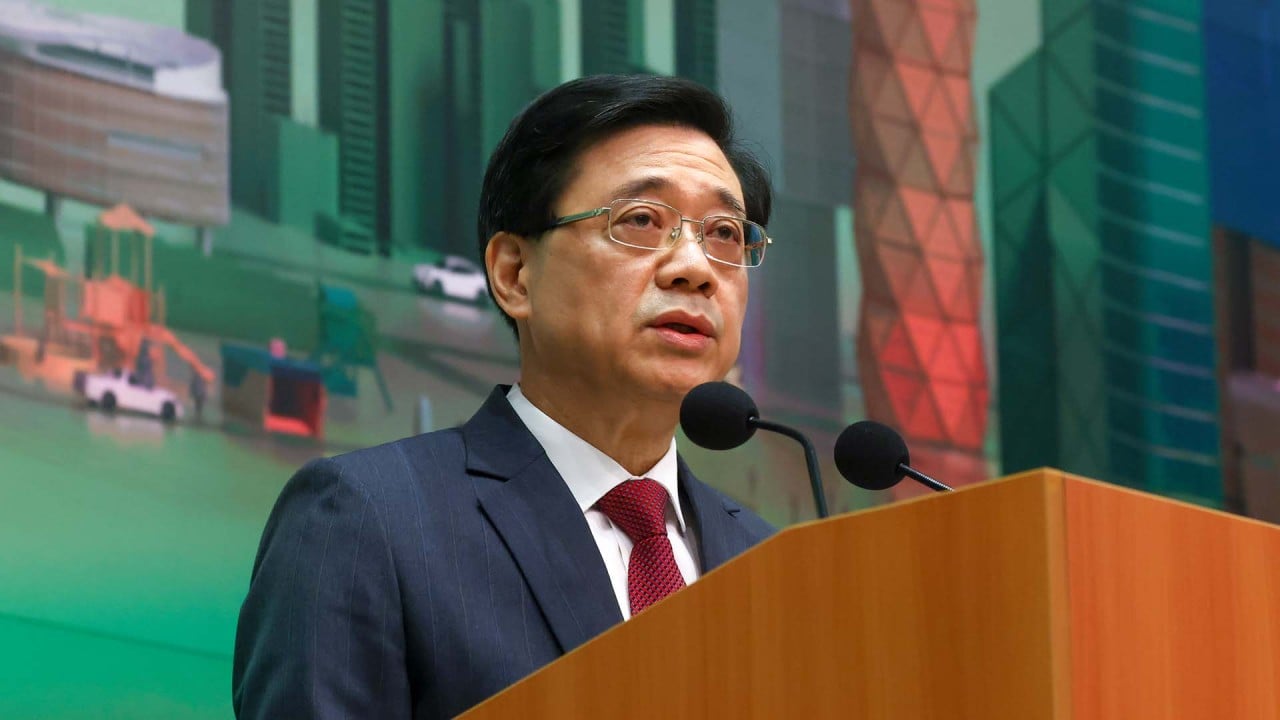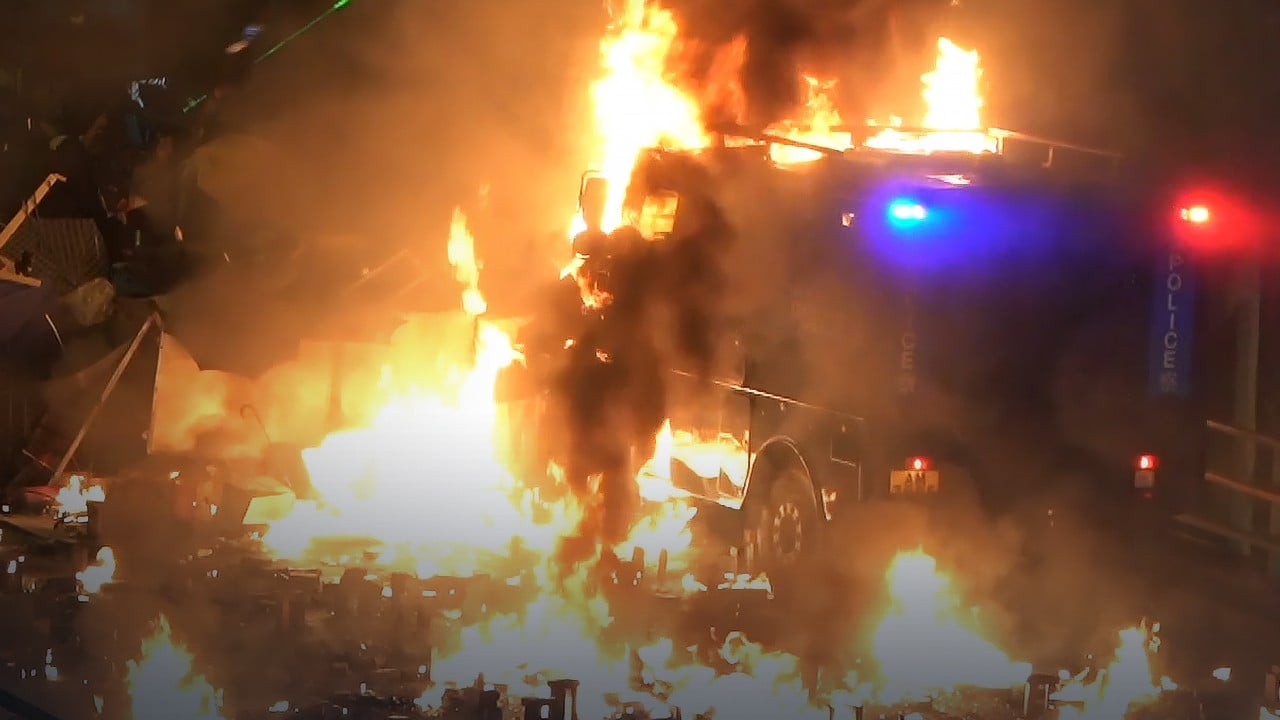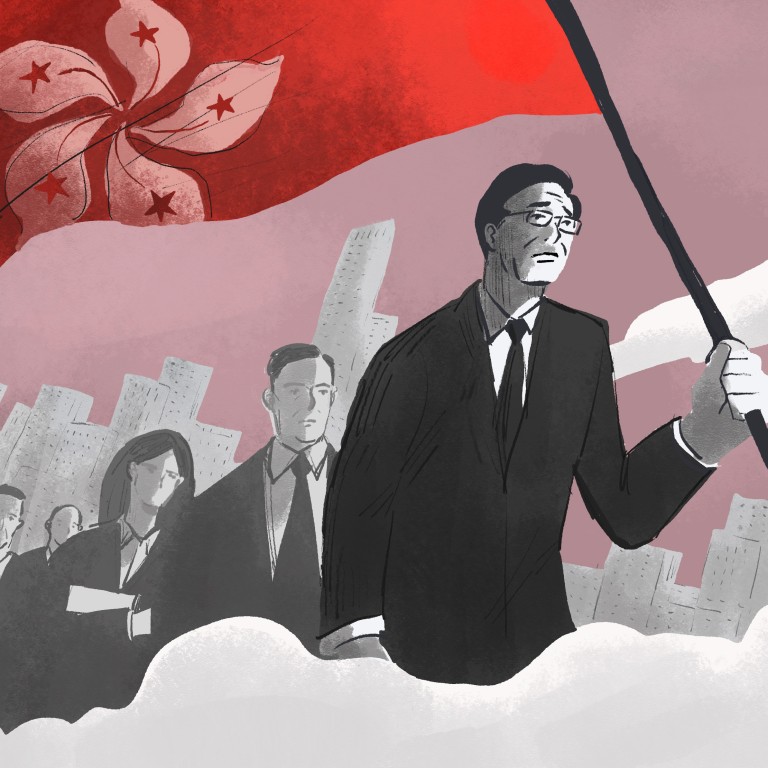
Hong Kong chief executive election 2022: why did Beijing pick John Lee to be the city’s next leader?
- Former No 2 official became Beijing’s favourite almost overnight, leaving many wondering what the central government saw in the police officer-turned-minister
- Observers note his mainland networks, unquestioning loyalty to Beijing and unencumbered status with no vested interests or ties to tycoons
That lesson appeared to stay with him. At the age of 20, Lee gave up an offer to study engineering at university and instead chose a career with the police force, where he rose through the ranks to become a deputy commissioner before becoming a political appointee as undersecretary for security and eventually claiming the Security Bureau’s top job.
On Wednesday, Lee submitted nominations from more than half of the small-circle committee that will pick the next chief executive on May 8, after announcing his bid on Saturday as the sole hopeful backed by Beijing. Nomination campaigns for Hong Kong’s leadership election previously lasted months, but this one was effectively over within days.

The speed with which Lee went from possible candidate to the man most favoured to win has been nothing short of astounding. Many have been left wondering what the career police officer-turned-minister is bringing to the table that has convinced the central government he is the best man to lead a city divided by politics and drained by a pandemic.
Comments by analysts and insiders suggested that the escalating pressure China faces over the Russian invasion of Ukraine and British and American accusations that civil liberties are declining in Hong Kong could have prompted Beijing to pick a strongman who could fight back, break stalemates at home and faithfully execute policies at the halfway point of the city’s “one country, two systems” governing formula.
“Strongman politics are at play now,” said Wilson Chan Wai-shun, an international relations scholar at Chinese University. “Lee’s toughness made him stand the highest chance [compared with others] to achieve the result Beijing hoped for amid the ongoing US-China tensions and dilemma in the diverging coronavirus-control policies globally.”
But critics remained sceptical over whether Lee could succeed where his previous leaders did not and win over residents without stepping over Beijing’s red line amid a high level of public distrust in officials.

When did the chips fall?
Rumours about Beijing’s preference for Lee only began to circulate widely in the weeks leading up to his campaign announcement. But the decision was made far earlier, insiders suggested. One veteran politician well connected with the central government said a critical juncture came last June when Matthew Cheung Kin-chung resigned as chief secretary.
The politician, who spoke on condition of anonymity, revealed that incumbent leader Carrie Lam Cheng Yuet-ngor nominated Secretary for the Civil Service Patrick Nip Tak-kuen to succeed Cheung, but Luo Huining, director of Beijing’s liaison office in Hong Kong, instead recommended Secretary for Constitutional and Mainland Affairs Erick Tsang Kwok-wai.
Beijing eventually went with Lee as its favoured choice.
“The central government chose Lee as it planned to groom him as a possible candidate for the next chief executive,” said the politician, who is a local delegate to the Chinese People’s Political Consultative Conference, the nation’s top advisory body. “Lee’s loyalty to Beijing was already known due to his track record in the police force and the Security Bureau.”
A look at the family behind Hong Kong chief executive hopeful John Lee
The value of mainland networks
Lee joined the force as a probationary inspector in 1977 after graduating from Wah Yan College (Kowloon), a Catholic boys school run by Jesuits.
Dubbed “Lee Sir” or “Chiu gor” meaning “elder brother Chiu”, he rose through the ranks to become chief superintendent in July 1997, the month Britain handed the city back to China, and assistant police commissioner in 2003. Across those decades, he attracted backers and critics for his tough, demanding style.
But in an interview published in the school’s 80th anniversary yearbook in 2004, Lee described himself as a compassionate officer, recalling that during one robbery, he abandoned his pursuit of the armed suspect and stayed with the wounded at the scene.
“We can take down the escaped robber later, but when a life is gone, it’s not returning,” he was quoted as saying.
The Post learned that during the 1990s, the many cases of cross-border crime gave Lee myriad opportunities to develop relationships with his counterparts on the mainland. His networks “became more extensive” when he was appointed as undersecretary for security in 2012 under Leung Chun-ying’s administration, a former civil servant who worked with him said. Nine years later Lee was made security minister before taking over Matthew Cheung’s role as the city’s No 2 official.
A rare bureaucrat
A pro-establishment source told the Post all four names were “on the list” when the liaison office solicited views from representatives from the bloc in February.
A prominent businessman said what made Lee appear different from many senior-ranking officials was his insistence on not drinking alcohol at dinners, although he heard others say the former bureaucrat did enjoy his wine.
“He’s definitely not a social person,” said the businessman, who asked to remain anonymous. “He did not open up to talk much about himself.”
That reserve could well have made him more appealing to Beijing, argued Lau Siu-kai, vice-president of the semi-official Chinese Association of Hong Kong and Macau Studies think tank. Here was a bureaucrat unencumbered by strong ties to tycoons and free of vested interests, qualities the central government might have examined closely in weighing aspirants for the top job, he noted.
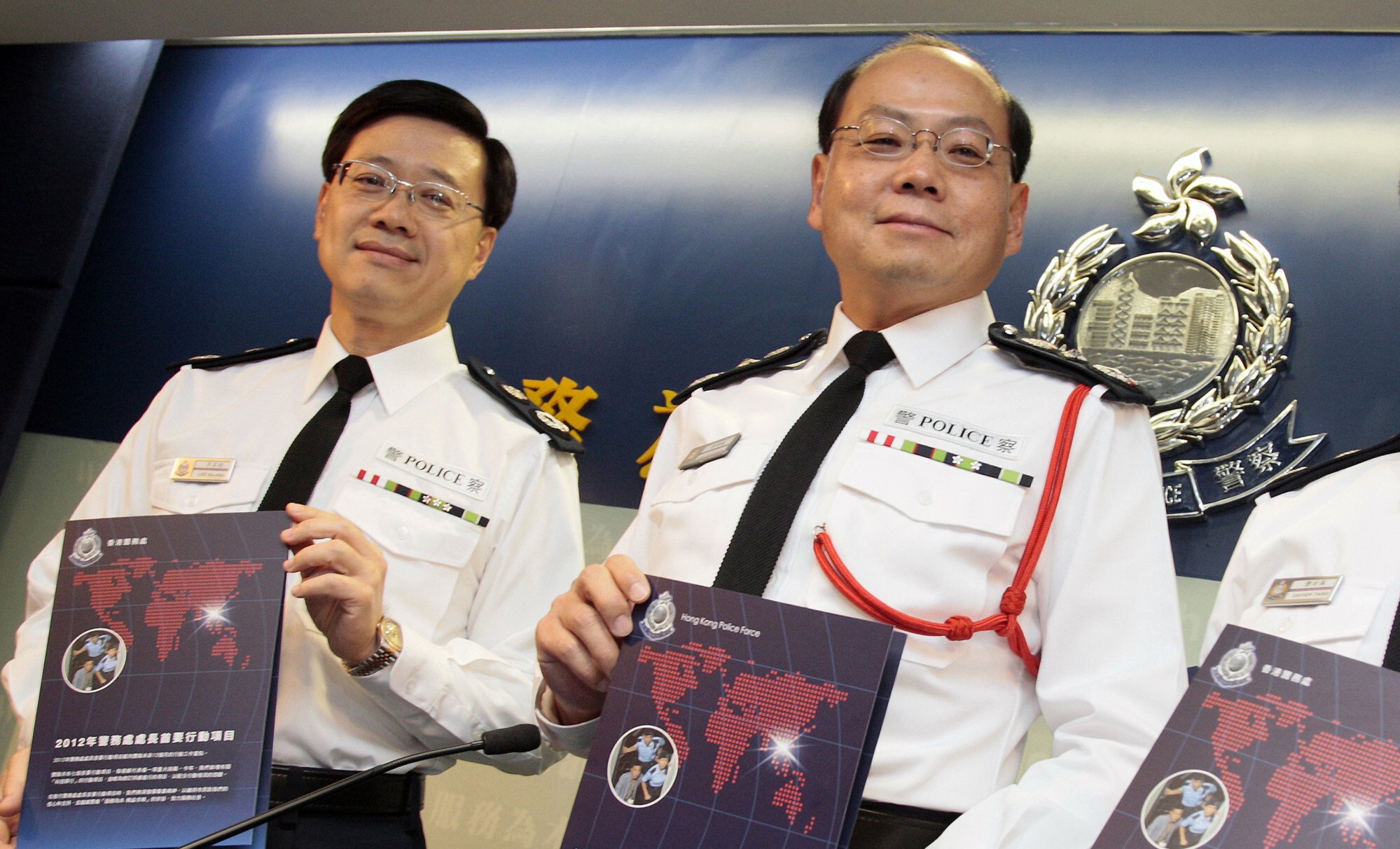
Another factor in Lee’s favour appeared to be his “unique status” as an official. He had an intimate knowledge of the inner workings of government and yet was not one of the out-of-favour mandarins of the administrative officer (AO) grade schooled in the ways of colonial bureaucracy, Lau argued. Lam and former leader Donald Tsang Yam-kuen are of AO pedigree.
“Veteran [administrative officers] are just too elitist and traditionalist. Their track records showed that some were not sufficiently loyal to Beijing,” he said.
According to the politician familiar with Beijing’s thinking, mainland officials still regarded Chan as “not so rounded” given he had been more focused on finance and the economy. But in a sign that the finance chief still had the trust of the central government, he was on Thursday appointed head of the committee that will vet chief executive hopefuls.
Who on John Lee’s campaign team will keep advising him if he wins Hong Kong poll?
“The central government is aware of the fact that nearly the whole pro-establishment is unhappy with Lam, in particular her handling of the pandemic in the past few months,” the politician said. “The Communist Party has been sticking to the mass line, which highlights the need of paying attention to the real needs of people, for many decades. Beijing can’t afford to go against the views of the majority of Hong Kong people to justify another five-year term for Lam.”
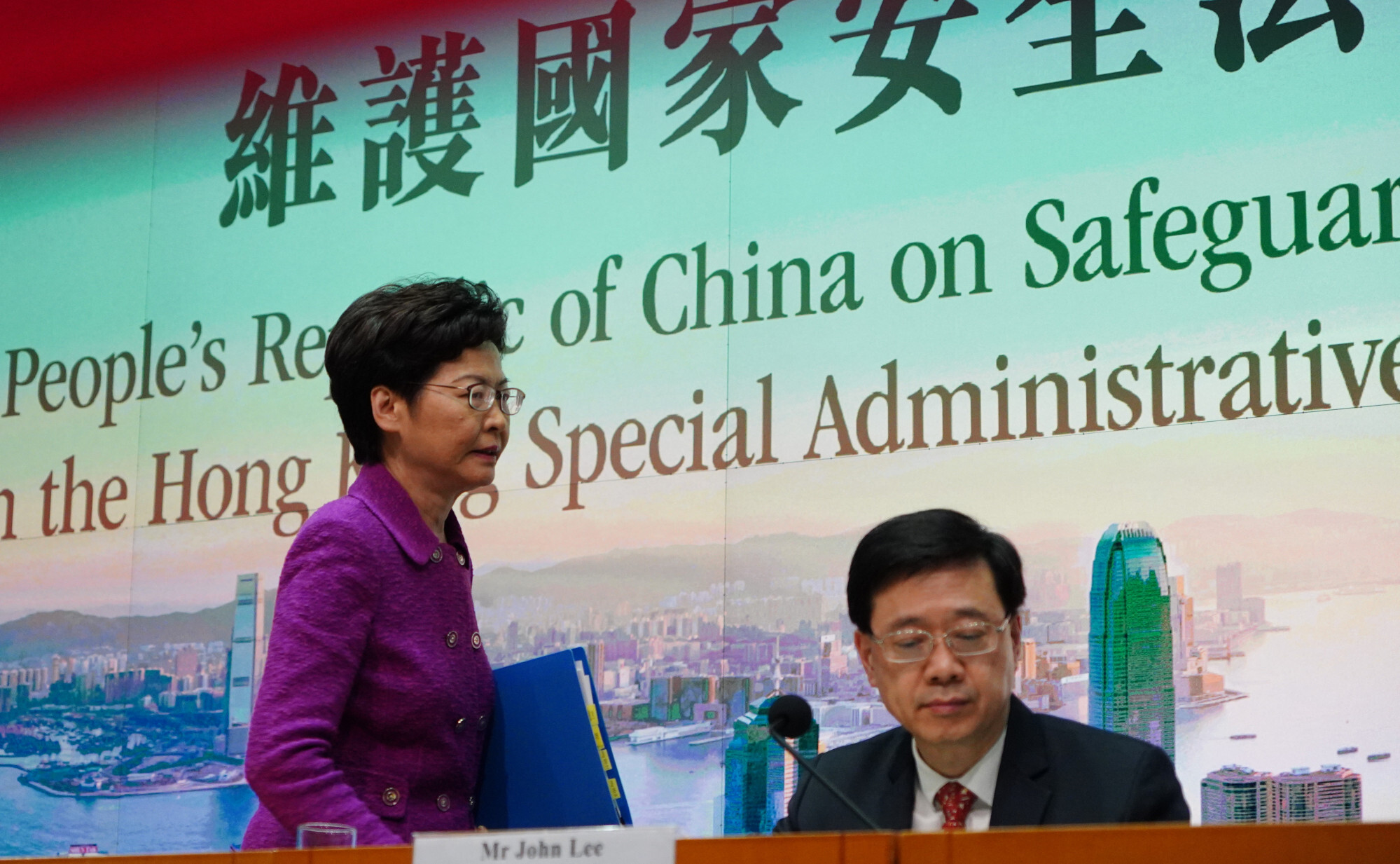
Lau said Lee’s decades of training in the disciplinary forces equipped him with the qualities to faithfully implement decisions by Beijing and complete challenging tasks that lay ahead, echoing requirements previously laid down by Xia Baolong, the director of the State Council’s Hong Kong and Macau Affairs Office, last July.
Xia said capable leaders must be firm patriots who loved Hong Kong, were proactive in safeguarding national security, possessed a problem-solving mindset and a strategic vision to defend China’s sovereignty and had the ability to unite all sectors for the sake of the city’s development.
Standing up to the West
Last month, the United States State Department released its annual report on the city’s affairs and claimed Beijing “played an unprecedented role in directing the outcome of the Hong Kong elections”. Britain also withdrew its only serving judges who sat on Hong Kong’s top court, saying that keeping them in place would “legitimise oppression”.
What was not lost on Beijing, said one government insider, was how the decision was intended to “poke the eye” of the Chinese government. It was announced within days after a seemingly amicable phone call between Chinese President Xi Jinping and British Prime Minister Boris Johnson in which they discussed the Ukraine war and the marking of 50 years of diplomatic relations.
John Lee says no need to revisit ill-fated Hong Kong extradition bill
Lau argued that against the backdrop of such developments, Beijing would prefer a tough Hong Kong leader with a national security profile who understood how to position and defend the city against escalating Western containment of China and any sanctions imposed in the aftermath of the Russia-Ukraine conflict.
But if sanctions or trade restrictions were enacted, Chan, the Chinese University scholar, said a Hong Kong leader would have little leeway to make a difference.
“Hong Kong’s role has been determined by geopolitics. Whoever the leader is can’t rewrite the city’s fate,” he said. “So it’s only the execution skills that matter.”
After meeting Election Committee members earlier this week, Lee said that legislating Hong Kong’s own security law, as required by Article 23 of the Basic Law, would be one of the top priorities of his administration, noting it was “a constitutional duty”.
The legislation would outlaw acts of treason, secession, sedition or subversion, as the existing one does, but also target theft of state secrets and ban foreign political organisations from conducting political activities in the city and local political organisations from establishing ties with overseas political bodies.
National security: what is Article 23 and why is it back in the spotlight?
The myth of business acumen?
In declaring his bid, Lee pledged his leadership would be “result-oriented” and vowed to boost Hong Kong’s competitiveness and ensure the city retained its status as a global financial hub. The security force veteran shrugged off concerns over his limited exposure to financial policies, saying that only God was a “know-all for everything”.
Within a short period of time, Lee assembled a 17-member campaign team that included finance, business and law specialists, with insiders saying that Beijing’s liaison office played a role in getting them on board to showcase formidable cross-sector support.
In the years since the handover, Hong Kong has been led by a deeply patriotic businessman, two veteran civil servants and a surveyor by trade. Among them, only Tsang, a 45-year civil service veteran, came from a financial background. Long before becoming chief executive, he served as the city’s first financial secretary and was known for defending the Hong Kong dollar’s peg to the greenback from attacks by hedge funds during the 1998 Asian financial crisis.
“It’s not reasonable to suggest that Hong Kong’s role as a financial centre cannot be defended when the leader is weak in finance policies,” argued Chan the scholar.
The next chief executive would be helped by institutions such as the Monetary Authority and Securities and Futures Commission, which played a crucial role in ensuring Hong Kong remained enticing for overseas investors, he said.
Chan also noted that Hong Kong was being gradually repositioned as a hub for the Greater Bay Area plan uniting 11 southern Chinese cities and the wider mainland market to tap global opportunities, as well as for foreign businesses seeking to expand over the border.
“The crux is whether Lee can mobilise talents to help the city grasp the opportunities accurately amid the repositioning of Hong Kong’s role,” he said.
Where is Hong Kong’s chief secretary? Why Beijing is slow to appoint a new No 2
Social unrest’s long shadow
The most controversial period of Lee’s career came when as security chief he steered the government’s response to the anti-government protests and helped oversee the implementation of the national security law the following year.
Lee’s face often appeared on placards held aloft by protesters demanding he and Lam step down over a now-aborted extradition bill that stirred the unrest. Both were instrumental in drafting the bill that would have allowed for the return of suspects to the mainland, as well as other jurisdictions. A group of alumni of the secondary school where Lee studied even published a petition in a newspaper condemning him as “a benumbed official who disregarded public opinion” in his handling of the crisis.
Lee’s net approval rating peaked at 27 points when he took up the role of security minister in mid 2017 and plunged to minus 63 points in October 2019, at the height of the protests, according to Hong Kong Public Opinion Research Institute. Last month before he resigned as chief secretary, his rating rose to minus 14 points, but a level still regarded as unsatisfactory.
During Lee’s campaign appearances, he was often asked by reporters to review his handling of the unrest. Earlier this week, the hopeful said he was willing to take ratings and criticisms as reference but urged the public against further discussing the matter, saying the extradition bill had “concluded and ended”, clearly eager to draw a line between the past and future.
Professor Steve Tsang, director of the SOAS China Institute at the University of London, remained sceptical about Lee’s suitability to take the top job, arguing he was responsible for turning the police force from an institution “respected by the people into one that was the most despised” in a matter of weeks in 2019.
“While this may show that he is prepared to get the job done by breaking conventions and rules, it shows above all that he is not interested in protecting what is the most valuable part of the institution for which he is responsible,” he said.
Leading at a critical juncture
The term of the next chief executive begins on July 1, when Hong Kong also marks the 25th anniversary of the handover, the halfway point in Beijing’s promised 50 years of significant autonomy for the city. But Tsang doubted Lee would fight to protect that degree of self-determination.
“What Hong Kong needs now is a leader who is trusted by the local community and able to unite most to work out what is the maximum degree of the residue of the so-called ‘high degree of autonomy’ in the new circumstances, and steer a course that people in Hong Kong want without crossing Beijing’s redlines. Lee is certainly not such a figure,” he said.
“Beijing has got a man it wants to run Hong Kong, but Hong Kong people may find their interests looked after even less well than under Carrie Lam.”
But the 25th anniversary touted as a “second return” for Hong Kong to mainland China would also be a chance for Lee to clear the detritus of past political clashes and steer a new path of closer ties with the motherland. Even though he had been associated with previous administrations, he had qualities that could work for Beijing in the “second return”.
According to Lau, one of Lee’s pressing tasks is uniting and strengthening a pro-Beijing camp plagued by infighting since the 2012 election, given they would be expected to play a crucial role in governing.
From Beijing’s perspective, the next five years were critical, he argued, adding: “If implemented smoothly under Lee’s leadership, the ‘one country, two systems’ could continue beyond 2047, which I see as of the utmost importance for Hong Kong’s prosperity and stability.”



